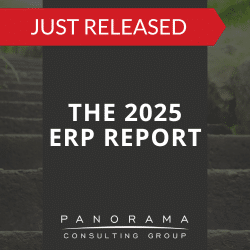Enterprise resource planning (ERP) is used to manage and integrate functions like marketing, finance, human resources, and supply chain management. While ERP software is a transformative solution for many business owners, others are too concerned about project failure to even get started.
By learning how to avoid ERP implementation failure, these organizations can overcome their fears and ensure their project succeeds. Keep reading if you’re in the same boat so you can learn how to ensure a successful ERP implementation.
How to Avoid ERP Implementation Failure
1. Consider Long-Term Plans
If you select ERP software that matches your current business needs, it may end up becoming misaligned with your processes when you make changes to your business.
For example, business owners may choose a product that doesn’t allow them to add new users even if the organization is planning on expanding in the next few years.
We recommend creating a roadmap for your future business plans and sharing this with ERP providers to ensure they can deliver software that will meet your current and future needs.
A Failed Payroll System Implementation
Panorama’s Expert Witness team was retained to provide a forensic analysis and written report to the court regarding the failed implementation of a major software developer’s ERP/payroll system.
2. Involve Executives
Your executive team should be involved in key project decisions, and we’re not just talking about budget approval. We’re talking about ongoing decisions about project goals and changes to business processes.
This ensures the software you select and the improvements you make align with overarching business goals.
3. Select the Right Implementation Partners
Besides ERP consultants, another implementation partner you’ll need is a systems integrator.
It’s essential to select the right systems integrator so you have the level of support you need.
Some systems integrators prioritize a quick implementation without any support options, so be sure to find partners with a great reputation that are dedicated to ensuring a successful ERP implementation.
4. Select the Right ERP System
Choosing the right ERP vendor is one of the most powerful ways to avoid ERP implementation failure.
There are more options for enterprise resource planning than ever before. Organizations can even find specific types of ERP systems created for their industry.
Because of this, it is essential to carefully select your software solution. We recommend creating a list of business requirements and prioritizing each item based on how essential it is.
Throughout the ERP selection process – whether you’re gathering requirements or looking for pain points in your processes – it’s important to work with an independent ERP consulting firm. These experts are unbiased and will recommend the solution that is best for your business with no financial incentives to sway them.
5. Establish Strong Project Governance
ERP project governance ensures the project team makes decisions aligned with the overarching business goals.
It’s important to use a project charter to assign certain team members the responsibility of approving requests, such as customization requests.
Executives and other employees may make requests that increase project scope and cost. If you have strong project controls, you will only approve requests that align with the organizational vision. This will reduce the risk of budget and timeline overruns.
6. Prioritize ERP Training
Another common mistake that business owners make that leads to ERP failure is underestimating the need for ERP training.
It is essential to train employees before implementing ERP software. If users are not trained in advance, it will take more time, resources, and money to get everyone up to speed after go-live.
7. Assess Project Risks
If you’re immersed in the project details, you may not be able to objectively assess risk. It’s important to involve a third-party, like a software consultant, as their view will be objective.
A third-party expert can assess all different types of risks by viewing your project through many different lenses: people, processes, and technology.
We recommend prioritizing these risks and creating a risk mitigation plan for those of highest priority.
8. Be Willing to Adjust Your Budget and Timeline
Implementing ERP software can be expensive. If you don’t have enough room in your budget for all components of the implementation process, this can lead to ERP failure.
Some overlooked costs include improvements to hardware, network, and other infrastructure. You may also overlook maintenance costs or the cost to fix bugs in the system that arise over time. Finally, you might overlook the cost of employee communication and training.
We always say that the estimated budget or timeline for ERP implementation should be flexible. In other words, you should adjust your budget and timeline as necessary and reset expectations before you’re nearing the end.
9. Get Additional Support
Often, ERP implementation issues arise as soon as your implementation partners leave. You might realize you don’t have the right training or didn’t ask the right questions during implementation. Other times, you might be struggling with end-user resistance.
We recommend working with ERP implementation consultants that can help your organization with post go-live optimization so you can ensure optimal benefits realization.
Learning From the Mistakes of Others
Our experience as a software expert witness has shown us how some of the biggest ERP implementation failures transpire. In most cases, the projects had very little strategic alignment and lacked a focus on change management and business process management.
Instead, organizations focused on finding the top ERP systems based on what their competitors were using.
Don’t let this be you. You now know how to avoid ERP implementation failure, and you know the importance of focusing on people and processes – and data!
The most successful ERP implementations are treated like business initiatives. This approach protects you from the technology-focused mindset that can lead to ERP failure.
Panorama’s ERP consulting team has this mindset. To meet some of our team members, request a free consultation below.













